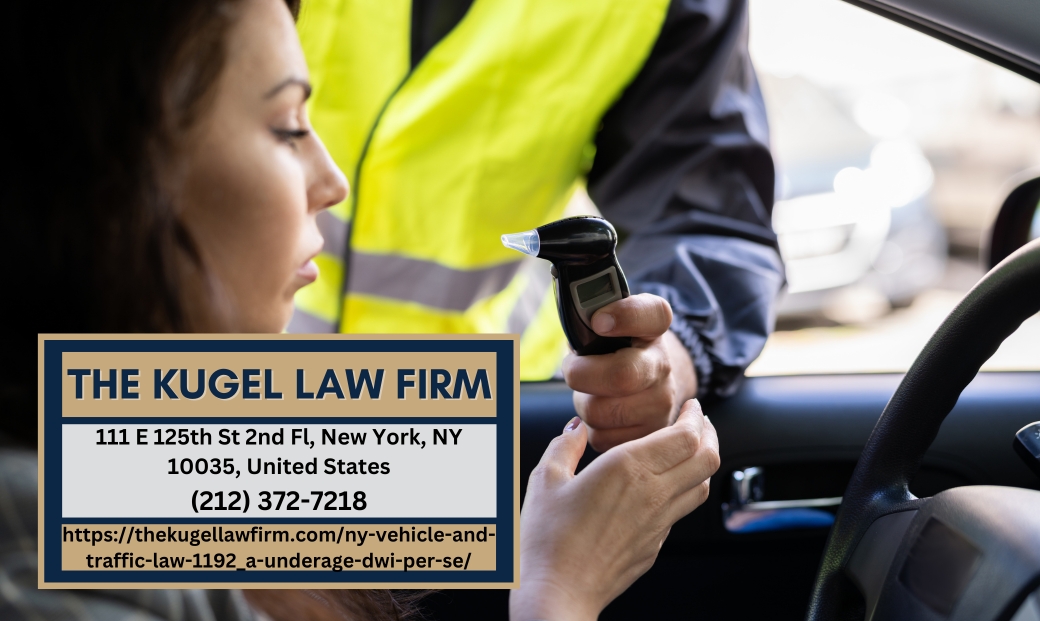New York DWI attorney Rachel Kugel (https://thekugellawfirm.com/ny-vehicle-and-traffic-law-1192_a-underage-dwi-per-se/) has provided an in-depth explanation of New York Vehicle and Traffic Law § 1192-a, which governs underage drivers operating a motor vehicle after consuming alcohol. This law, often referred to as the Zero Tolerance Law, applies to drivers under the age of twenty-one who operate a vehicle with a blood alcohol content (BAC) between 0.02% and 0.07%. Rachel Kugel of The Kugel Law Firm highlights that under this statute, a driver can face penalties even if they do not appear impaired.
Rachel Kugel, a New York DWI attorney, emphasizes that the law enforces a strict per se standard. A single drink may be enough to trigger a violation, as proof of impairment is not required. She points out that the law is handled through the Department of Motor Vehicles (DMV) as an administrative matter rather than through the criminal court system. While these violations do not result in a criminal record, they can still carry significant consequences for young drivers. According to Rachel Kugel, “New York’s Zero Tolerance Law under § 1192-a applies to drivers under 21 who are caught operating a vehicle after consuming even a small amount of alcohol. The law sets a strict BAC threshold and is enforced through administrative penalties, separate from criminal DWI charges”.
For drivers and families seeking clarity, Rachel Kugel explains that enforcement of § 1192-a typically begins with a lawful traffic stop. Officers must have a valid reason, such as speeding or a broken taillight, to initiate the stop. If alcohol consumption is suspected, field sobriety and chemical tests are used to determine BAC levels. Rachel Kugel, serving as a New York DWI attorney, explains that a reading of 0.02% or higher is sufficient to initiate a Zero Tolerance charge. Penalties for a first violation can include a six-month license suspension, a $125 civil penalty, and a $100 service fee to reinstate driving privileges. Repeat violations within five years lead to harsher consequences, such as a one-year revocation of driving privileges or longer, along with additional fees.
The DMV hearing process, as outlined by Rachel Kugel, functions much like a mini-trial, where evidence is presented, and an Administrative Law Judge determines whether a violation occurred. The burden of proof is “clear and convincing evidence,” which is slightly less demanding than the criminal court standard but still significant. Rachel Kugel explains that if law enforcement fails to meet the necessary requirements, including a lawful traffic stop and valid chemical testing, the violation cannot stand.
Rachel Kugel notes that there are legal defenses available for underage drivers charged under § 1192-a. Challenging the legality of the traffic stop, questioning the accuracy of BAC results, and examining whether procedural requirements were met are common approaches. Procedural errors, such as improperly completed paperwork or failure to give correct warnings, may result in dismissal of the violation. She stresses that the presence of alcohol in the system is only relevant if proven within the required statutory guidelines.
According to Rachel Kugel, even though violations under § 1192-a are not criminal, they can have lasting impacts on a young driver’s life. License suspensions and revocations can interfere with school, work, and daily activities, while insurance premiums and long-term records may also be affected. In addition, underage alcohol-related offenses can influence college admissions and employment opportunities.
Rachel Kugel advises that underage drivers charged under this law should seek representation to navigate DMV hearings and protect their rights. A New York DWI attorney can review the legality of the stop, scrutinize the testing process, and present defenses before the Administrative Law Judge. Rachel Kugel stresses that having representation at this stage can reduce or dismiss penalties and help protect the future of young drivers.
The Kugel Law Firm continues to provide legal support for those charged under New York’s Zero Tolerance Law. Rachel Kugel makes clear that the consequences of a violation extend beyond the immediate penalties, and that legal guidance can help minimize long-term effects.
Those affected by § 1192-a violations should consider taking action promptly. Legal support can play an important role in protecting driving privileges, reducing penalties, and addressing the broader consequences of an underage alcohol-related charge. Rachel Kugel’s insights into the law highlight the seriousness of these cases and the importance of taking them seriously.
About The Kugel Law Firm:
The Kugel Law Firm, led by Rachel Kugel, represents individuals facing charges under New York’s DWI and related statutes. The firm is committed to helping clients navigate DMV hearings and court processes while working to protect their driving records and future opportunities.
Embeds:
Youtube Video: https://www.youtube.com/watch?v=CYqwtCjT_dE
GMB: https://www.google.com/maps?cid=17189431107850367088
Email and website
Email: admin@thekugellawfirm.com
Website: https://thekugellawfirm.com/new-york-dwi-lawyer/
Media Contact
Company Name: The Kugel Law Firm
Contact Person: Rachel Kugel
Email: Send Email
Phone: (212) 372-7218
Address:111 E 125th St 2nd Fl
City: New York
State: New York 10035
Country: United States
Website: https://thekugellawfirm.com/new-york-dwi-lawyer/

